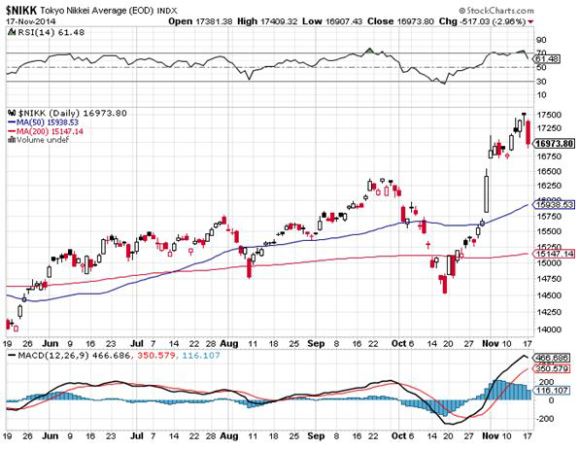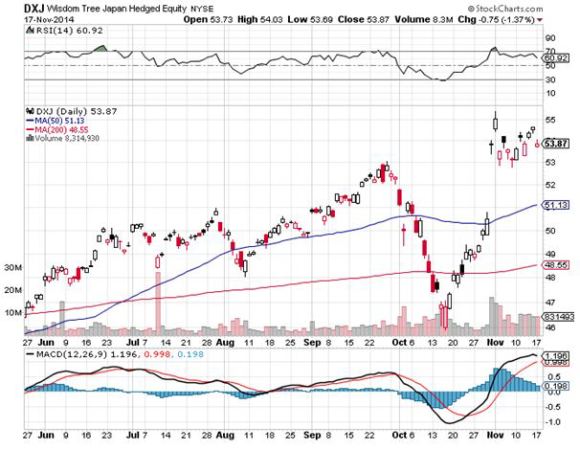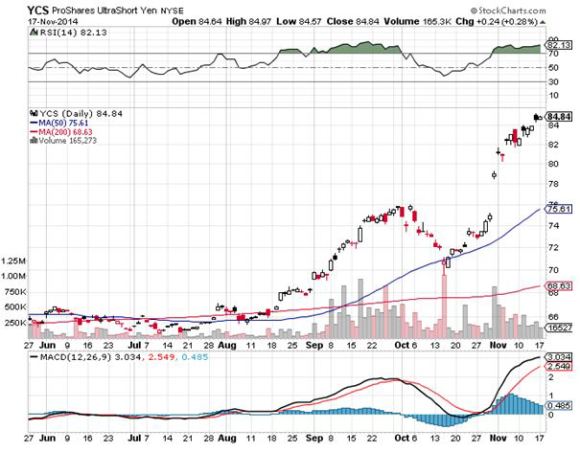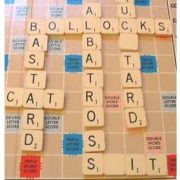Japan?s Rude Awakening
Traders in Japan suffered a rude awakening yesterday morning when the Ministry of International Trade and Industry announced that the troubled country?s GDP shrunk by -1.6% during the third quarter. Analysts had been expecting a gain of 2.2%.
What?s worse, this is the second consecutive quarter of negative GDP, meaning that the Land of the Rising Sun is now solidly in recession, the fourth since 2008, and the umpteenth since the country fell off a demographic cliff 25 years ago.
The Nikkei Average took it on the kisser, plunging some 3% from its high for the year. The Wisdom Tree Japan Hedged Equity ETF (DXJ) declined by half as much.
Half of the gain since the Bank of Japan?s ?shock and awe? monetization measures on October 15 went up in smoke. Now we know why the central bank had been so aggressive and preemptive.
There are immediate implications from the dismal numbers. Prime Minister Shinzo Abe is almost certain to delay a hike in Japan?s VAT sales tax from 8% to 10% scheduled for the new fiscal year starting April 1.
This year?s rise, from 5% to 8%, is viewed as the chief culprit responsible for the shocking slowdown.
It turns out that clever consumers rushed to beat the tax, pulled their spending forward, creating an artificial boost to economic growth in the first quarter. This lulled the government and Japanese retailers, into thinking their recovery strategy was working.
After the tax increase took effect, the spending boom ground to a complete halt, and the economy came to a juddering stop. The end result was a huge inventory build that was the most destructive aspect of the terrible GDP numbers, as higher prices caused consumers to stay away from the stores in droves.
The conservative Abe was behind the government?s grab for more revenues to head off the country?s runaway budget deficit, which is now seen by many economists as reaching catastrophic proportions, some 160% of total GDP.
The problem is that governments should balance budgets when they can, not when they want to. I have lost count of how many Japanese recoveries have been smothered in the cradle by premature tax increases over the last two decades.
Thank goodness the US government had the sense not to try that here, or we?d all be standing in breadlines by now.
The global implications of a new Japanese recession are, fortunately, not as dire. It?s not like many analysts had built in a Japanese economic miracle into their long-term growth forecasts. Japan only accounts for 7% of world GDP these days, and losing a couple percent of that annualized doesn?t move the needle much.
The fall of the Japanese yen this year has been so rapid and dramatic that there hasn?t nearly been enough time for it to have a positive impact on the economy. It will going forward. That alone should pull the country back out of recession in the current quarter.
Remember too that since Japan is far more dependent than America on imported energy, it will benefit greater from the ongoing collapse in the price of oil.
The disastrous GDP numbers should also encourage the BOJ to become even more aggressive in its own reflationary efforts. Think more growth of the money supply, more quantitative easing, and faster. Buy Japanese printing press stocks!
Fortunately, all of these global, multi market cross currents distill down into a single trade for you and I: sell more yen.
A substantially weaker Japanese currency seems to be the one stop solution for all of Japan?s many intractable problems.
You already saw this in action in the foreign currency markets on Monday after the GDP numbers came out. Normally, a downside surprise of this magnitude on the economic data front generates a big ?flight to safety? move across all asset classes. That would have caused the Japanese yen to rise sharply against the buck.
Not this time. In fact, it barely moved. Japan and yen bears weren?t waiting a nanosecond to sell short more of the beleaguered currency, offsetting whatever profit taking there was from pre existing shorts the GDP figures might have incited.
So the set up here is to sell short the Currency Shares Japanese Yen Trust ETF (FXE), or to buy the 2X ProShares Ultra Short Yen ETF (YCS), two positions I have been recommending non stop for the past three years.
It looks like we have only just gotten started with out big down move in the yen.











